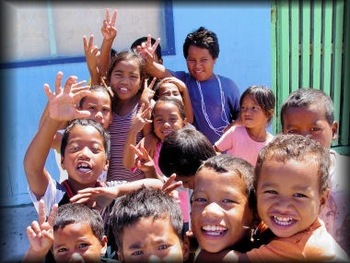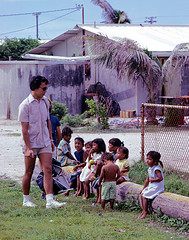National Training Council – Marshall Islands

RMI Education and Skills Strengthening Project
The Government of the Republic of Marshall Islands has actually gotten financing from the World Bank for the Education and Skills Strengthening Project (ESSP) expense. It means to apply part of the profits for seeking advice from services.
The consulting services (“the Services”) will help the Project Manager and the RMI National Training Council in implementing the World Bank-funded task effectively.

The assignment will focus on supporting the Project Implementation Unit (PIU) in producing a framework for Recognition of Prior Learning (RPL) for TVET, focused on helping the College of the Marshall Islands and the rmi national training council National Training Council evaluate and boost the abilities of workers through certified college certification.
The in-depth Terms of Reference (TOR) for the task are suggested in the attached Terms of Reference (ToR).
The National Training Council now invites eligible individuals (“Consultants”) to indicate their interest in supplying the Services. Interested Consultants must offer details demonstrating that they have the needed credentials and appropriate experience to perform the Services (attach a Cover Letter of no greater than 4 (4) pages addressing the compulsory experience and credentials requirements curriculum vitae with a description of experience in comparable tasks, comparable conditions, etc). Companies’ personnel might reveal interest through the using firm for the task. In such a scenario, just the experience and certifications of people will be considered in the selection procedure. The requirements for electing the Consultant are: A.
Mandatory Qualifications and Experience Master’s degree in education, training
, management, or an associated field. Minimum of 5-10 years of experience working in TVET System. Curriculum Design and Systems.
Possess 2-5 years’ experience developing and
executing RPL. frameworks, policies, and treatments. A sample of previous work will be needed as proof of previous experience. Outstanding interaction, training, and assistance
skills. Experience with working with varied stakeholders, including government. firms, TVET organizations, employers, and learners in the Pacific. B. Desired Qualifications and Experience Capability to deal sensitively in a multicultural
environment and build efficient team relationships with clients and appropriate stakeholders. The attention of interested Consultants (including firms )is drawn to paragraphs 3.14, 3.16 and 3.17 of the World Bank’s”
Procurement Regulations for IPF Borrowers “July 2016 revised November 2020” Procurement Regulations “, setting forth the World Bank’s policy on conflict of interest. Further information can be obtained at the address below during workplace hours, 0900 to 1700 local time. Expressions of interest must be
provided in a written form to the address listed below (face to face or by e-mail )by 5:00 pm, 23rd December 2024.
The subject line must state:”National Training Council Strategic Plan Consultant -complete name of the candidate”. Julius Lucky Director National Training Council!.?.!ntcdr@ntcinfo.org:Phone: 692 625-4521 Empowering Community Champions for Sustainable Development in RMI Gender Equality, Climate Resilience and Water Safety Training Majuro,
Republic of the Marshall Islands: The 4th
Women and Youth Training for
Gender Equality, Climate Change, Disaster Risk Reduction and Water Safety Management has recently happened at the University of the South Pacific’s school in Majuro, the Republic of the Marshall Islands(RMI ). This vital training was organized by the United Nations Development Programme( UNDP )Pacific Office through the Addressing Climate Vulnerability in the Water Sector(ACWA) job. The week-long capacity-building training intended to empower females and youth with the knowledge and practices required for climate-resilient water security management in the
Republic of the Marshall Islands(RMI ). This training reinforces a commitment to boosting RMI’s water security and community strength against environment modification effects, specifically females
and youth, making sure that no one is left. The training invited individuals from all 24 atolls and included resource speakers from government agencies, non-governmental organizations, and worldwide advancement partners from the RMI Environmental Protection Authority, Climate Change Directorate, Office of the Chief Secretary, Ministry of Culture and Internal Affairs, National Disaster Management Office, Women United Together Marshall Islands, RMI Human Trafficking Task Force, Waan Aelõñ in Majel, Jo-Jikum, and the International Organization for Migration. In her opening remarks, Secretary for the Ministry of Culture and Internal Affairs, Brenda Alik, underscored the significance of cumulative action in building a climate-resilient country.”It is our obligation to come together and work together. As we deal with the challenges positioned by climate change, understanding its influence on our water resources is essential for enhancing the wellness of communities throughout the Marshall Islands,”she said.
RMI Environmental Protection Authority General Manager Moriana Philip highlighted in her speech the necessary role of women and youth in dealing with climate-related obstacles.”This workshop unites us from various neighborhoods to address the pressing issues we face today, including climate-related difficulties, especially on our water resources.”We wish to emphasize the important function of ladies and youth in this job as your involvement is instrumental to its success and beyond, “she said.
The first day of the workshop covered critical concerns connected to gender equality, human rights, and public health within the Marshall Islands. It included discussions on gender equality and mainstreaming, focusing on the effects of environment modification on water security and the disproportionate results on susceptible groups. The value of incorporating gender equality and social addition into all task elements was also discussed. Human rights and human trafficking were dealt with, worrying the requirement for extensive defense of vulnerable populations
during emergency situations. Furthermore, the workshop dealt with gender-based violence, highlighting the various types that can emerge in disaster circumstances, such as domestic violence and sexual coercion. The program concluded with a concentrate on sanitation and hygiene and their essential role in health, livelihoods, school participation, dignity, and structure durable communities. ACWA Project Manager Koji Kumamaru revealed his appreciation to all participants
, highlighting the importance of their contributions to their communities.”Women and youth are crucial to the success of the ACWA project. More notably, you are the champs and future leaders who will return to your communities to empower others,”he stated. During the workshop, individuals went to Rongrong Island and analyzed the 15,000-gallon Flatpack Modular water tank installed at the Rongrong High School Boys Dormitory as part of the ACWA task. The setup is a crucial part of the task, matched by assistance from Australia
‘s Department of Foreign Affairs and Trade. The check out served as an important firsthand experience of the positive effect of the ACWA project on the neighborhood and its
water resources. Marie Naisher from Jabat Island expressed her thankfulness for the chance to join the workshop and explained her desire to be part of the task when it reaches Jabat.
“This was my first time participating in such training, and I learned so much from the visitor speakers, group activities, and the site go to. I now understand the significance of clean water and how to sterilize it. I’m ecstatic about the ACWA project coming to Jabat and prepared to assist when it arrives,”she stated. Don Kobney, an ACWA site planner from Santo, Kwajalein, likewise shared his enjoyment.”The workshop and website see boosted my self-confidence and understanding of the water tank installation.
Seeing the 15,000-gallon flatpack modular water tank firsthand offered me a clear understanding of the system, and I’m eagerly anticipating sharing this understanding with my neighborhood, “he stated. By the workshop’s end, participants were better equipped to understand climate change and its local impacts, drive adjustment and mitigation efforts, especially in water safety, and use new resources to impact their communities favorably. ACWA is enabled thanks to the assistance of the Green Climate
Fund, with the job co-financed by the Government of the Republic of the Marshall Islands

. The Marshall Islands: Skills Training and Vocational Education Project Assesses the efficiency of the task and highlights lessons. Offers inputs to two wider examinations- the local examination of ADB support for the Pacific and the unique evaluation study on Millennium Development Goals. The low instructional achievement and lack of Marshallese skilled workers were largely due to the low quality of fundamental education, lack of access to education in the external islands, and weaknesses in abilities training and the vocational and technical education system.
These supported an economy marked by high unemployment because of constrained economic sector growth and federal government downsizing. Joblessness was specifically high among the youth and ladies in the outer islands. Appropriate local proficient personnel for existing task vacancies
were unavailable, thus the importation of properly competent foreign employees. Hence, there was an inequality between offered jobs and abilities of the Marshallese labour force. These conditions offered the initiative for the Government
of the Marshall Islands to prioritize technical and occupation education training reforms. In 2000, ADB approved a loan for $9.1 million to enhance abilities training to supply trained workers needed for continual economic and social development. This was to be accomplished through an integrated nationwide abilities training system. The task consisted of four components: advancement of a profession awareness program, abilities training improvement, enhanced skills training chances for females and youth, and institutional fortifying. The expected outcome was increased income-generating opportunities and work for trainees, specifically ladies and youth in the outer islands. Overall, the task was rated not successful. Restricted development was accomplished in making the project responsive to the requirements of its beneficiaries and private-sector employers. The long-standing weakness of bad numeracy and literacy competencies
among public elementary and secondary school graduates and dropouts going into college or participating in voc-tech education could be partly attributed to the poor quality of basic education. The job was supply-driven and might not establish a strong linkage with private sector requirements or align its activities with the needs of the labour market. The status of the technical and professional education training system has actually stayed basically the same after project conclusion. The study advanced that ADB could encourage the Government of the Marshall Islands, through consultation and policy discussion, to follow through on the government’s
commitment to establishing a committed labour details system to link technical and vocational education training program offerings with market demand. Although the task established a labour market information system, in the absence of internal personnel ability at the National Training Council, it was not completely functional.

